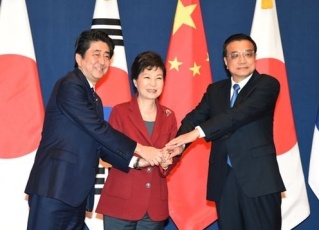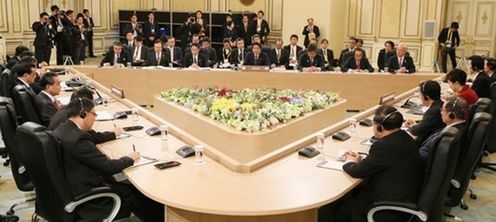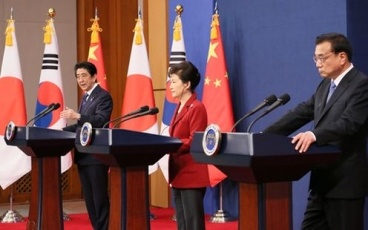Asia
The Sixth Japan-China- ROK Trilateral Summit
November 2, 2015
 Photo: Cabinet Public Relations Office
Photo: Cabinet Public Relations Office
 Photo: Cabinet Public Relations Office
Photo: Cabinet Public Relations Office
 Photo: Cabinet Public Relations Office
Photo: Cabinet Public Relations Office
The Sixth Trilateral Summit of Japan, the People's Republic of China and the Republic of Korea (ROK) was held in Seoul, ROK from 2:00pm to 3:30pm on November 1. The outline of the meeting is as follows. (Among those attending the meeting on the Japanese side were Prime Minister Shinzo Abe and Mr. Fumio Kishida, Minister for Foreign Affairs. Participants on the ROK side included Ms. PARK Geun-hye, President of the ROK and Mr. Yun Byung-se, Minister of Foreign Affairs of the ROK. Participants on the People's Republic of China side included Dr. LI Keqiang, Premier of the State Council of the People's Republic of China and Mr. Wang Yi, Foreign Minister of the People's Republic of China.) After the summit, ''Joint Declaration for Peace and Cooperation in Northeast Asia'', together with ''Joint Statement on Environmental Cooperation (PDF) '', ''Joint Statement on Economy and Trade Cooperation (PDF)
'', ''Joint Statement on Economy and Trade Cooperation (PDF) '', ''Joint Statement on Customs Cooperation on Trade Facilitation (PDF)
'', ''Joint Statement on Customs Cooperation on Trade Facilitation (PDF) '', ''Joint Statement on Agricultural Cooperation (PDF)
'', ''Joint Statement on Agricultural Cooperation (PDF) '', and ''Joint Statement on Education Cooperation (PDF)
'', and ''Joint Statement on Education Cooperation (PDF) '' were issued.
'' were issued.
 '', ''Joint Statement on Economy and Trade Cooperation (PDF)
'', ''Joint Statement on Economy and Trade Cooperation (PDF) '', ''Joint Statement on Customs Cooperation on Trade Facilitation (PDF)
'', ''Joint Statement on Customs Cooperation on Trade Facilitation (PDF) '', ''Joint Statement on Agricultural Cooperation (PDF)
'', ''Joint Statement on Agricultural Cooperation (PDF) '', and ''Joint Statement on Education Cooperation (PDF)
'', and ''Joint Statement on Education Cooperation (PDF) '' were issued.
'' were issued.
- 1 Trilateral Cooperation
- 2 Regional and Global Situations
- 3 Other Issues
- 4 The Next Trilateral Summit
1 Trilateral Cooperation
(1)The three Leaders shared the view that trilateral cooperation had been completely restored on the occasion of this summit held for the first time in three and a half years, reaffirmed that the Trilateral Summit should be held on a regular basis, and welcomed steady progress made in various areas of trilateral cooperation. In addition, they appreciated the efforts made by the Trilateral Cooperation Secretariat (TCS) for advancing trilateral cooperation, and discussed the current status and future directions of specific cooperation projects.
(2) More specifically the three Leaders decided to further strengthen cooperation in a number of areas including disaster risk reduction, environment, youth exchange, and economy. Prime Minister Abe noted the positive outcomes of the Fourth Trilateral Ministerial Meeting on Disaster Management held in Tokyo prior to this summit, and expressed his intention to host the Trilateral Youth Summit in Japan next year. He stated that he would like to make further efforts towards the acceleration of the trilateral FTA negotiations and the Regional Comprehensive Economic Partnership (RCEP) negotiations in order to achieve early conclusion of comprehensive and high-level agreements as an important pillar towards the economic integration of East Asia.
(2) More specifically the three Leaders decided to further strengthen cooperation in a number of areas including disaster risk reduction, environment, youth exchange, and economy. Prime Minister Abe noted the positive outcomes of the Fourth Trilateral Ministerial Meeting on Disaster Management held in Tokyo prior to this summit, and expressed his intention to host the Trilateral Youth Summit in Japan next year. He stated that he would like to make further efforts towards the acceleration of the trilateral FTA negotiations and the Regional Comprehensive Economic Partnership (RCEP) negotiations in order to achieve early conclusion of comprehensive and high-level agreements as an important pillar towards the economic integration of East Asia.
2 Regional and Global Situations
(1)Situation in Northeast Asia
The three Leaders reaffirmed their firm opposition to the development of nuclear weapons on the Korean Peninsula and shared the view that international obligations and commitments under all relevant UN Security Council resolutions and the Joint Statement of the Six-Party Talks should be faithfully implemented. They expressed their opposition to any action that may cause tension on the Korean Peninsula. They decided to continue their joint efforts to resume the Six-Party Talks in a meaningful manner. Prime Minister Abe called on both the People's Republic of China and ROK for their understanding and cooperation on the early resolution of the abductions issue.(2)Regional Cooperation in East Asia
The three Leaders affirmed the importance of trilateral cooperation in East Asia regional cooperation, and resolved to make efforts towards the economic integration of East Asia with the establishment of the ASEAN Community in 2015 in view. Regarding the East Asia Summit (EAS), marked by the 10th anniversary of its establishment this year, Prime Minister Abe stressed the importance of strengthening discussions on political and security issues and reinforcing the institution as the premier forum of the region.(3)Global Economy
The three Leaders vowed to work in concert to address challenges wrought by the global economy, to create conditions to sustain the recovery of global economy, and to foment increased economic growth. In addition, they look forward to meaningful progress at the G20 Summit and APEC Economic Leaders' Meeting among other conferences. Prime Minister Abe introduced his newly-announced ''three arrows'' namely ''the strong economy'', ''cares and supports for raising children'', and ''social security leading to people's peace of mind'', and resolved to contribute to regional and global economic growth.(4)Global Issues
The three Leaders welcomed the official adoption of the 2030 Agenda for Sustainable Development at the UN Sustainable Development Summit, and decided to cooperate for the adoption of a legally binding, and ambitious agreement applicable to all parties at the 21st session of the Conference of the Parties to the UN Framework Convention on Climate Change (UNFCCC COP21). Prime Minister Abe emphasized the importance of the agreement as a new legal and suitable framework applicable to all Parties, and the importance of support for initiatives for health care such as infectious disease prevention and promotion of Universal Health Coverage (UHC), and of the establishment of the World Tsunami Day(5)Counterterrorism and Middle East and Africa
Regarding the counterterrorism and Middle East and Africa, Prime Minister Abe emphasized that ISIL is a serious threat to the international community more than ever and that multifaceted and longstanding measures in cooperation with relevant countries were important. In addition, he welcomed the resumption of the Trilateral Consultation on Counterterrorism and Trilateral Policy Dialogue on African Affairs and the decision to hold a trilateral policy consultation meeting on Middle Eastern and North African affairs,3 Other Issues
History issues were mentioned during this summit and Prime Minister Abe stated that he issued a statement on the 70th anniversary of the end of World War II in August this year, which stated that Japan will take the lessons of history and the position articulated by the previous cabinets will remain unshakable into the future and that based on the path Japan had taken as a peace-loving nation for the past 70 years, Japan was determined to contribute to the peace and prosperity of the world more than ever before. He also stated that we needed not only to squarely face the history but also to cooperate together toward the future, and that it was not productive to focus on a certain period of the past. He then concluded that Japan-ROK and Japan-China had a history of cooperation and shared development, and he hoped to continue to write a looking-forwarded history of this trilateral cooperation.
4 The Next Trilateral Summit
The three Leaders reached a consensus to hold the Seventh Trilateral Summit in Japan next year. Prime Minister Abe expressed his intention to play a role of the chairman to enhance further positive cooperation, based on the discussions in the Sixth Trilateral Summit, and stated he looked forward to welcoming in Japan Ms. PARK Geun-hye, President of the Republic of Korea and Mr. LI Keqiang, Premier of the State Council of the People's Republic of China.

